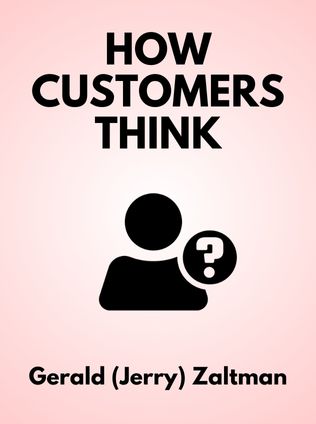
How Customers Think
Essential Insights into the Mind of the Market
By Gerald (Jerry) Zaltman
Published 02/2003
About the Author
Gerald Zaltman is a distinguished professor of marketing at Harvard Business School and a fellow at Harvard University's interdisciplinary Mind, Brain Behavior Initiative. With his extensive background in the field, Zaltman has made significant contributions to understanding consumer behavior and marketing strategies. He is also the co-founder of Olson Zaltman Associates, a research and consulting firm known for its innovative approach to uncovering deep consumer insights. Zaltman's work bridges the gap between traditional marketing theories and the latest advancements in neuroscience and psychology.
Main Idea
In "How Customers Think: Essential Insights into the Mind of the Market," Gerald Zaltman explores the intricate workings of the consumer's mind and how marketers can effectively leverage this understanding to create successful marketing strategies. He delves into the conscious and unconscious processes that shape consumer behavior, emphasizing that marketers often misinterpret or overlook the true drivers behind purchasing decisions. By understanding the metaphors, stories, and memories that influence consumers, marketers can craft messages that resonate deeply and drive desired behaviors.
Table of Contents
- What Marketers Need to Know
- The Brain
- Illuminating the Mind
- The Importance of Metaphor
- Consensus Maps
- The Fragile Power of Memory
- Stories
- Stories and Brands
- Memory, Story, and the Self
- Understanding Your Own Thinking
- Thinking Creatively
- Quality Questions and Answers
What Marketers Need to Know
Zaltman begins by addressing the fundamental misconceptions many marketers hold about consumer behavior. He argues that effective marketing is deeply rooted in understanding the mind, and that the failure of approximately 80 percent of new products and services within six months can often be attributed to marketers' lack of insight into their consumers' minds. To truly understand consumers, marketers must expand their range of disciplines beyond anthropology, psychology, and sociology to include neurology, musicology, philosophy, and zoology.
Current Limiting Theories of Use
Marketers often handicap themselves with limiting views, such as the belief that consumers think in a well-reasoned, rational manner. Zaltman refutes this by explaining that the selection process is largely driven by emotion, the unconscious mind, and the social and physical context. He states:
“Ninety-five percent of thinking happens in the unconscious mind.” - Gerald Zaltman
This highlights the importance of delving deeper into the unconscious processes that drive consumer behavior rather than relying solely on verbal explanations or surface-level data.
The Brain
Zaltman emphasizes that marketing is a function of the mind, which resides in the brain. The cerebral cortex, with its 30 billion neurons, is where cognition occurs. He explains that the brain interacts with the mind, body, and society in a dynamic way that shapes both the marketer's and the consumer's thoughts and behaviors. This mutual influence structure is further complicated by the interactions between conscious and unconscious processes.
Thought is Based on Images, Not Words
According to Zaltman, most thought is based on neural images rather than discrete words. He explains:
Sign up for FREE and get access to 1,400+ books summaries.
You May Also Like
The Subtle Art of Not Giving a F*ck
A Counterintuitive Approach to Living a Good Life
By Mark MansonHow To Win Friends and Influence People
The All-Time Classic Manual Of People Skills
By Dale CarnegieFreakonomics
A Rogue Economist Explores the Hidden Side of Everything
By Steven D. Levitt and Stephen J. DubnerQuiet: The Power of Introverts
The Power of Introverts in a World That Can't Stop Talking
By Susan CainIf You Tell
A True Story of Murder, Family Secrets, and the Unbreakable Bond of Sisterhood
By Gregg OlsenThe Lean Startup
How Today's Entrepreneurs Use Continuous Innovation to Create Radically Successful Businesses
By Eric Ries



















